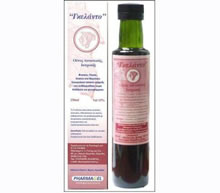
Λεξικό .. κληρονομικό αγγειοοίδημα
hereditary angioedema, κληρονομικό αγγειοοίδημα: HAE is a rare genetic disorder that manifests as acute recurrent attacks of skin swelling, abdominal pain, and potentially life-threatening upper airway obstruction. Symptoms can last for up to 4 days, and although HAE attacks are self-limiting, their unpredictable and debilitating nature profoundly affects the quality of life of patients, restricting their ability to lead normal lives.
For many years the treatment of choice for acute attacks has been to administer plasma-derived C1 -esterase inhibitor (C1-INH) intravenously. However, the identification of bradykinin as the key mediator of HAE attacks has opened up the bradykinin pathway as a target for novel treatment options. One such treatment option is icatibant, a potent and specific bradykinin B2 receptor antagonist that provides rapid symptom improvement of HAE attacks. Two years ago icatibant was approved in the European Union (EU) for the symptomatic treatment of acute HAE attacks in adults with C1-INH deficiency.
As the current guidelines for treating HAE predate the approval of icatibant in the EU, the reporting of real-life experiences using icatibant may help clinicians to optimise the management of patients with HAE. Indeed, there is a need for HAE treatment guidelines to be updated, following the availability of treatment options in Europe and the US within the last 2 years.
References
Bork K. Recurrent angioedema and the threat of asphyxiation. Dtsch Arztebl Int. 2010 Jun;107(23):408-14. Epub 2010 Jun 11.
Γκέλης Ν.Δ. - Λεξικό Αλλεργίας - Εκδόσεις ΒΕΛΛΕΡOΦΟΝΤΗΣ - Κόρινθος 2013
Gelis Ν.D. - Dictionary of Allergies - VELLEROFONTIS Publications - Corinth 2013




